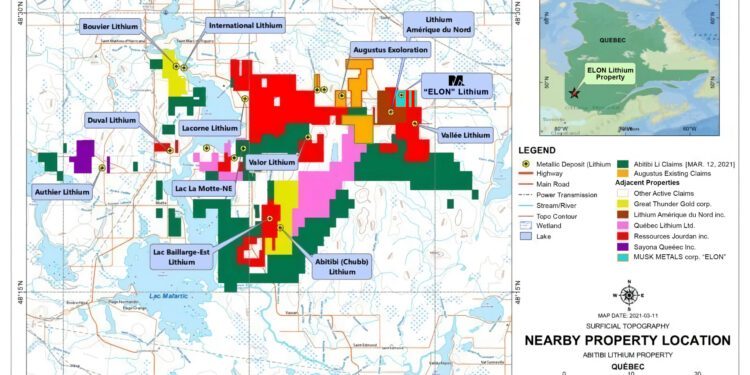Follows Hi-Res Heliborne Magnetic Survey In Quebec
Musk Metals Corp. (CSE: MUSK) (OTC: EMSKF) has completed its first ground survey on its 100% owned Elon Lithium Property in Quebec, located approximately 600m northeast of the Lithium Amérique du Nord project, which produced over 907,000 tonnes of material, at 1.40% LiO2 from 1955 to 1965.
CEO and Director, Nader Vatanchi, said the company also recently completed a high-resolution heliborne magnetic survey conducted by Prospectair Geosurveys Inc. that identified magnetic anomalies that could relate to felsic or intermediate intrusions hosted into volcanics, which was Phase 1 of a three Phase exploration program.
Following this survey, Musk Metals started Phase 2 which include data compilation, geological mapping, trenching and sampling. Phase 3 should be conducted during the fall and would consist of diamond drilling and metallurgical testing.
Field Observations
Exploration work shows that a thick layer of sand covers the centte and northern part of the Property, while more outcrops and till are available on the southern part. The survey discovered outcrops and boulders that demonstrate that the geology of the Property is a favorable host for lithium mineralization.
Boulders and outcrops showed gabbros associated with felsic and mafic intrusions. Some of the outcrops are associated with chloritic and potassic alterations.
Mineralisation associated with the outcrops includes pyrite, pyrrhotite and chalcopyrite ranging from traces to 5% content (pyrite). Multiple samples are also interesting for their gold and base metals potential.
The main low magnetic anomalies found during the previous airborne survey has yet to be explained. On the southern part of the Property, soils samples in till were taken and should allow the company to better define where potential lithium mineralisation may be found in relation to the magnetic low, by using glacial drift directions and assay results.
Finally, multiple boulders (glacial floats) were also sampled during this work phase. Sampled boulders include gabbros, felsic intrusions and also quartz veins (associated with copper mineralisation).
A total of 19 outcrop rock samples, 22 boulder samples and 29 till samples were collected and sent to ALS Laboratories for trace elements analysis. The company expects to receive the results in the following month and will report them once interpretation is completed. Musk Metals’ 100% owned Elon Lithium project spans over 245 hectares in the La Corne and Fiedmont townships of Quebec, strategically located approximately 600m northeast of the Lithium Amérique du Nord (formerly Mine Québec Lithium). The current work programme includes data compilation from historical work and a comparison of field observations with the airborne magnetic survey, while assay results are pending.
“Musk Metals is continuing its 2021 work programs on both of our highly prospective lithium projects situated in active lithium camps with lithium deposits in close proximity,” Vatanchi, said.
“The preliminary work completed to date will allow the company to better define the potential for lithium mineralization and so far, the results are encouraging with the identification of potential host rock for lithium mineralisation along with some mineralisation found in outcrops and boulders.
“The correlation of those sample and the till survey results will better define targets for the company to explore in the following phase of work which should consist of trenching to complete Phase 2 and to be followed by Phase 3, which will include drilling and metallurgical testing of any lithium mineralisation discovered.”
For further information please visit: https://muskmetals.ca/












